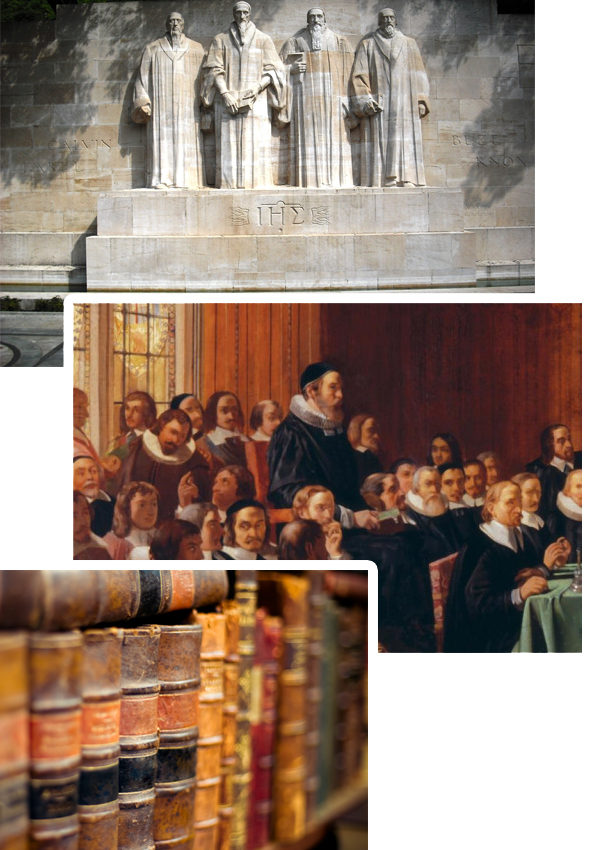The confession consists of 33 chapters stating the sole doctrinal authority of Scripture, and it agrees with and restates the doctrines of the Trinity and of Christ from the creeds of the early church.
The Larger Catechism was prepared for the use of ministers and is too detailed for memorizing. It is divided into two parts that discuss the doctrines and duties that Christians are to believe and follow.
The Shorter Catechism was prepared primarily for instructing children in the faith. It is composed of a brief introduction on the end, rule, and essence of religion and of 107 questions and answers.
Reformed theology takes its name from the Protestant Reformation that took place in the sixteenth century when the church was reformed to be more Biblical in its teaching and practice. It has also been called “Calvinism” after John Calvin, who so clearly and systematically taught these doctrines in his Institutes of the Christian Religion, and “Augustinianism” after Augustine, who defended these doctrines in the fourth and fifth centuries. It might also be called “Paulinism” because though it is taught throughout the Bible, it is especially emphasized in the epistles of Paul. While our preference would be to eschew all “isms” and simply call ourselves Christ followers or Christians, out of deference to others who believe differently but still claim the name of Christ, we use the name reformed to describe ourselves.
It is important to distinguish between fundamental, essential doctrines that Scripture defines as necessary to be believed for salvation (if you shall confess with your mouth the Lord Jesus, and shall believe in your heart that God hath raised him from the dead, you shall be saved) and secondary doctrines (such as baptism, church government and eschatology) concerning which sincere believers may come to different interpretations of the Scriptural teaching without departing from the Christian faith. What is often called the Reformed faith encompasses the many Biblical teachings as they were recovered during the Protestant Reformation. While everything Scripture teaches is important and much needed in our day, we do not believe it is necessary to understand or hold to all these teachings in order to get to heaven, nor even to be members of this church. However, these teachings are what distinguishes us from other Bible-believing Protestant churches.


The supremacy (or sovereignty) of God in and over all things is the focal point of scripture. Before the creation of this world, God ordained all that would come to pass. He owns all things, has rights of ownership over all things, and controls all things according to His will (Genesis 50:20; Isaiah 46:10; Daniel 4:25, 35; Acts 2:23; 4:27-28; Ephesians 1:4-5, 11).
God’s supremacy in all things is true in the matter of salvation as well. This Scriptural teaching has come to be nicknamed “the doctrines of grace” because they emphasize that salvation is by grace – God’s unearned favor – alone. Man only comes to God after God has first worked in that particular person’s heart to draw him (John 6:44, 37).
Some have difficulty understanding this teaching, others become unsettled by it, and many fight very hard against it. We believe much of this opposition arises because these scriptural truths directly confront man’s sinful desire to put himself on God’s throne.Even Christians often have a humanistic viewpoint of the universe. We see ourselves, not God, as the center of all things and we rebel against the idea that we were created solely for God’s glory. Only as we submit to God and His Word can we accept the idea that we are but clay pots made by God to use as He desires (Romans 9:18-24). When we grasp that, then our praise to God truly becomes overwhelming as we thank Him for all the unmerited riches that He has graciously bestowed on us undeserving sinners.
While we must always stand for all that the Bible teaches, we also acknowledge the need to speak the truth of Scripture in love and wait for the Lord to open hearts (II Timothy 2:23-25) in his time.
Thomas & Steele, The Five Points of Calvinism: Defined, Defended, and Documented
Loraine Boettner, The Reformed Doctrine of Predestination
John Murray, Redemption Accomplished and Applied
Robert Raymond, The New Systematic Theology of the Christian Faith
John Calvin, The Institutes of the Christian Religion
The Westminster Confession of Faith


